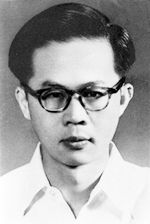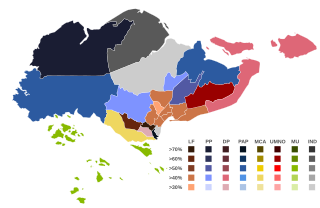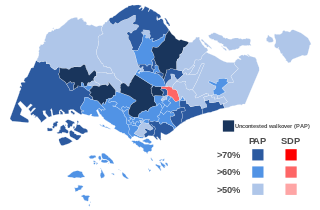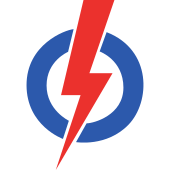
Lee Kuan Yew, often referred to by his initials LKY, was a Singaporean barrister and statesman who served as the founding Prime Minister of Singapore between 1959 and 1990, and Secretary-General of the People's Action Party between 1954 and 1992. He was the Member of Parliament (MP) for Tanjong Pagar from 1955 until his death in 2015. Lee is widely recognised as the founding father of the modern Singaporean state, and for his leadership in turning the island from a third-world to a first-world country.

The People's Action Party is a major conservative centre-right political party in Singapore and is one of the three contemporary political parties represented in Parliament, alongside the opposition Workers' Party (WP) and Progress Singapore Party (PSP).

Barisan Sosialis was a political party in Singapore. It was formed on 29 July 1961 and officially registered on 13 August 1961 by left-wing members of the People's Action Party (PAP) who had been expelled from the PAP. The prominent founding members of the Barisan were Lee Siew Choh and Lim Chin Siong. It became the biggest opposition party in Singapore in the 1960s and the 1980s.

Lim Chin Siong was a Singaporean politician and union leader active in Singapore in the 1950s and 1960s. He was one of the founders of the governing People's Action Party (PAP), which has governed the country continuously since independence. Lim also used his popularity to galvanise many trade unions in support of the PAP.

Lim Yew Hock was a Singaporean-born Malaysian politician and diplomat who served as Chief Minister of Singapore between 1956 and 1959. He was the Member of Parliament (MP) for Cairnhill between 1959 and 1963 and previously a Member of the Legislative Council and later Legislative Assembly between 1948 and 1963. He was the 2nd de facto Leader of the Opposition between 1959 and 1963. He and his family elected to take up Malaysian citizenship after Singapore's independence from Malaysia.

General elections were held in Singapore on 21 September 1963, five days after Singapore became part of Malaysia. Voters elected all 51 members of the Legislative Assembly. The elections were the only ones to date with no boundary changes to any existing constituencies prior to the elections. The result was a victory for the People's Action Party (PAP), which won 37 of the 51 seats, while the majority of the remaining seats were won by Barisan Sosialis (BS).

Sinnathamby Rajaratnam, better known as S. Rajaratnam, was a Singaporean statesman, journalist and diplomat who served as the first Minister for Foreign Affairs between 1965 and 1980, and Deputy Prime Minister of Singapore between 1980 and 1985. Rajaratnam is widely recognised as one of the founding fathers of Singapore. He was also one of the founders of the People's Action Party (PAP), which has governed the country continuously since independence.
Ong Pang Boon is a Singaporean retired politician who served as Minister for Home Affairs between 1959 and 1963 and again for a short period of time in 1970, Minister for Education between 1963 and 1970, Minister for Labour between 1971 and 1981, and Minister for the Environment between 1981 and 1985.

Toh Chin Chye was a Singaporean statesman and academic who served as Deputy Prime Minister of Singapore between 1959 and 1968. Toh is widely recognised as one of the founding fathers of Singapore. He was also one of the founders of the People's Action Party (PAP), which has governed the country continuously since independence.

Ong Eng Guan was a Singaporean politician who served as Minister for National Development between 1959 and 1960. An anti-communist, Ong was a Chinese-educated orator who became popular among the Chinese community in Singapore. He was also one of the pioneering members of the governing People's Action Party (PAP). He was elected into the City Council of Singapore and became the first and only elected mayor in Singapore's history after the 1957 City Council election.

General elections were held in Singapore on 2 April 1955 to elect members to the 25 elected seats in the Legislative Assembly. Nomination day was on 28 February 1955.

General elections were held in Singapore on 22 December 1984. President Devan Nair dissolved parliament on 4 December 1984 on the advice of Prime Minister Lee Kuan Yew. The result was a victory for the People's Action Party, which won 77 of the 79 seats, marking the first time since 1963 that at least one opposition candidate was elected to parliament in a general election, although the first presence of an opposition MP was in the 1981 Anson by-election.

General elections were held in Singapore on 3 September 1988. President Wee Kim Wee dissolved parliament on 17 August 1988 on the advice of Prime Minister Lee Kuan Yew. The result was a victory for the People's Action Party, which won 80 of the 81 seats.
This is the only Prime Ministerial Election in Singapore history. The People's Action Party Central Executive Committee met on the victory of the 1959 Singaporean general election to elect a Prime Minister. At the end of the election, Lee Kuan Yew won by a mere 1 vote, that was voted by the then party Chairman Toh Chin Chye.
The 5th Parliament of Singapore was a meeting of the Parliament of Singapore. It commenced its first and only session on 3 February 1981 and was dissolved on 4 December 1984.
The 4th Parliament of Singapore was a meeting of the Parliament of Singapore. Its first session commenced on 7 February 1977 and was prorogued on 2 October 1978. It commenced its second session on 26 December 1978 and was dissolved on 5 December 1980.
The 1st Parliament of Singapore was a meeting of the Parliament of Singapore. It commenced its first and only session on 8 December 1965 and was dissolved on 8 February 1968.
The 3rd Legislative Assembly of Singapore was a meeting of the Legislative Assembly of Singapore. Its first and only session started on 22 October 1963 and ended on 16 June 1965. The assembly was dissolved on 9 August 1965 and was succeeded by the 1st Parliament of Singapore.
The 2nd Legislative Assembly of Singapore was a meeting of the Legislative Assembly of Singapore from 1 July 1959 until 3 September 1963.

Thampore Thamby Rajah, better known as T. T. Rajah, was a Singaporean politician and lawyer who served as Secretary-General of the People's Action Party for a short period of time in 1957 before joining the Barisan Sosialis in 1961.













